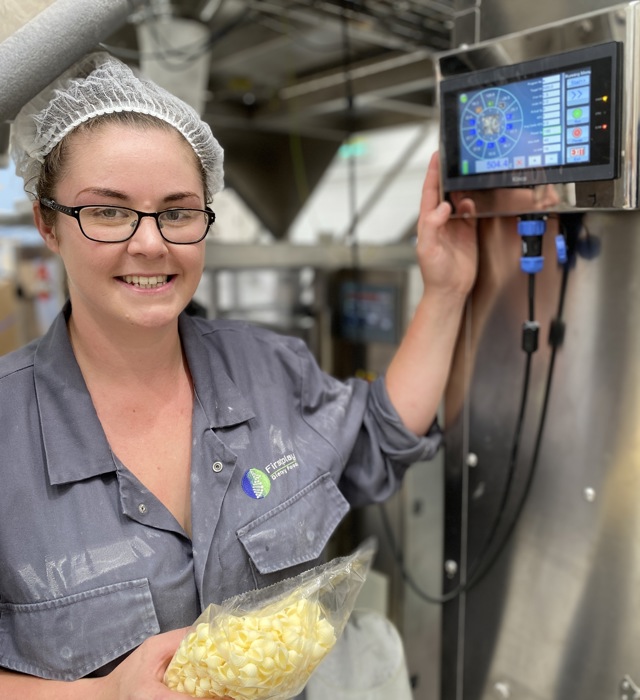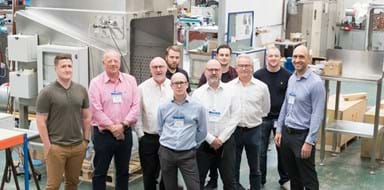
A food producer, supported by Made Smarter, has taken its first steps towards its ambition to create the world’s first smart black pudding factory.
The Bury Black Pudding Company (BBPCo) has used its traditional recipe for more than 100 years and has expanded its range to include vegan, vegetarian, gluten free and chilli black pudding versions.
Its factory in Bury and 95-strong workforce produce 85 tonnes of the delicacy each week, helping the company achieve a £6m turnover.
By embracing a strategy of continual improvement, BBPCo with the help of The University of Central Lancashire (UCLan) has trained an in-house Industry 4.0 Innovation Team to identify and target areas of improvement and potential technology solutions.
View the case studyOur ambition is to create the world’s first smart black pudding factory. We have identified a pathway to achieving that ambition which starts with data and systems integration, then analytics, and automation. Working with the team at Made Smarter has accelerated our plan by years.
Richard Morris, Managing Director of The Bury Black Pudding Company
While BBPCo has invested in its machinery and its workforce to process increasing demand, the company recognises it needs a root and branch revamp of its processes to achieve its ambitions of becoming a much more automated factory.
“Until a few years ago Industry 4.0 was just a phrase I kept hearing,” Richard explained. “I was too busy getting on with the job to investigate how it applied to our business. When I finally took some time to see how we could benefit from digital tools and technologies it was a lightbulb moment and I’ve never looked back.”
After upskilling his management team and developing a digital transformation strategy, Richard established a set of key objectives including: system integration to capture and display real-time data; analytics to identify potential efficiencies; increased automation to reduce human intervention; increased production and capacity to build stocks for seasonal sales spikes; and improved accuracy and reduced waste.
Richard said: “Over the years we have developed an in-house method of collecting and collating the data from every area of the business into what we call our factory flow spreadsheet. Without it we couldn't operate. But the process of analysing it with a view to understanding how the business is doing and what can be done to improve it, is very time consuming and onerous, plus it can take place weeks after the event. What we need is an automated solution to capture the data, analyse it and display in real-time.”
BBPCo also identified an opportunity to improve production of its main stick and chub consumer packs.
The company currently uses a manual method of checking the mean weight of a product run, which is then recorded on paper and analysed for anomalies.
“Employing a manual system to double or treble check accuracy or identify mistakes, and adhere to legal mean weight requirements, is very costly,” Richard said. “With digital tools we could streamline the process, improve accuracy, give our sales department complete oversight of availability for customers, and reduce waste.”
BBPCo is in the process of scoping its entire operation to identify the critical upgrades needed for its IT infrastructure to connect to a new enterprise resource planning (ERP) management software.
These include digitising paper-based documents used in its quality department’s internal auditing, and upgrading electrical panels and install USB panels on machines to collect the data from machinery. Other plans include updating its time and attendance system, and eurotherm systems, which controls cooking and fridge temperatures.
A second project will introduce a Handtmann Filler VF 838s8/HCU/Weight Regulator Machine which connects the weighing and filling process. It will mean that every clipped product that is weighed by the operative will automatically correct the filler machine portion control to a pre-set giveaway ‘allowance’, ensuring a more consistent product.
The data that is harvested will then provide the ‘mean’ weight for the product run which is a legal requirement for Weights & Measures auditors.
BBPCo calculates that improving the accuracy of its weighing and filling process will reduce product giveaway by one percent, a saving of around 750Kg for a 60-ton production run, which can be reused, and improve consistency for the end user.
It will significantly reduce the labour associated with the weighing and checking process, redeploying that effort into other areas of the business.
“Improving the weighing and filling process is the perfect place for us to start to achieve efficiencies and illustrate to the whole organisation what system integration and data can do for the business,” Richard said. “The eventual aim is for everything to link to an ERP system which can give us the real-time oversight we long for.”
“I want this new system to empower my senior management to make decisions based on the data, to be creative to get the job done more efficiently and to engage the entire workforce to see why we make the decisions we do and bring them along on the journey.”
While BBPCo is some way off from achieving its ambition of a smart factory, the roadmap is there.
Data analytics is a project Richard is keen to focus on next.
“Every nine weeks or so I spend an entire day looking at the data and trying to figure out what we’ve achieved and how we can make improvements,” Richard said. “I should be working on the business, not in the business. We have 10 plus years of data sat there waiting to be analysed. Once we have a system that can capture the data and clean it up, we can begin forecasting with solid facts behind us.
“I want to be walking in on a Monday morning to an efficiency meeting looking at what the ERP is spitting out and all the analysis to tell us what we need to do to deliver better efficiencies. Then it’s down to us to get it done.”








